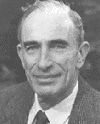 (source)
(source)
|
Paul R. Ehrlich,
(29 May 1932 - )
American biologist and educator.
|
Science Quotes by Paul R. Ehrlich, (6 quotes)
[The National Academy of Sciences] would be unable to give a unanimous decision if asked whether the sun would rise tomorrow.
— Paul R. Ehrlich,
In David M. Rorvik, 'Ecology’s Angry Lobbyist: Dr. Paul Ehrlich Argues That the Chief Cause of
Pollution Is Overpopulation', Look (21 Apr 1970). As quoted and cited in Columbia World of Quotations (1966).
Few problems are less recognized, but more important than, the accelerating disappearance of the earth’s biological resources. In pushing other species to extinction, humanity is busy sawing off the limb on which it is perched.
— Paul R. Ehrlich,
In Ashton Applewhite, William R. Evans and Andrew Frothingham, And I Quote (2003)
It has been stated that the research should be discontinued because it involved “meddling with evolution.” Homo sapiens has been meddling with evolution in many ways and for a long time. We started in a big way when we domesticated plants and animals. We continue every time we alter the environment. In general, recombinant DNA research docs not seem to represent a significant increase in the risks associated with such meddling—although it may significantly increase the rate at which we meddle.
— Paul R. Ehrlich,
In letter to the Board of Directors of Friends of the Earth, published in The Coevolutionary Quarterly (Spring 1978), as abstracted and cited in New Scientist (6 Jul 1978), 35.
Overdrafts on aquifers are one reason some of our geologist colleagues are convinced that water shortages will bring the human population explosion to a halt. There are substitutes for oil; there is no substitute for fresh water.
— Paul R. Ehrlich,
In The Population Explosion (1990), 30.
The key to understanding overpopulation is not population density but the numbers of people in an area relative to its resources and the capacity of the environment to sustain human activities; that is, to the area’s carrying capacity. When is an area overpopulated? When its population can’t be maintained without rapidly depleting nonrenewable resources…. By this standard, the entire planet and virtually every nation is already vastly overpopulated.
— Paul R. Ehrlich,
In The Population Explosion (1990), 39.
The problem in the world is that there are too many rich people.
— Paul R. Ehrlich,
In Associated Press, 'Population Expert Faults Wealthy', Sarasota Herald-Tribune (6 Apr 1990), 15A.
See also:
- 29 May - short biography, births, deaths and events on date of Ehrlich's birth.
 In science it often happens that scientists say, 'You know that's a really good argument; my position is mistaken,' and then they would actually change their minds and you never hear that old view from them again. They really do it. It doesn't happen as often as it should, because scientists are human and change is sometimes painful. But it happens every day. I cannot recall the last time something like that happened in politics or religion.
(1987) --
In science it often happens that scientists say, 'You know that's a really good argument; my position is mistaken,' and then they would actually change their minds and you never hear that old view from them again. They really do it. It doesn't happen as often as it should, because scientists are human and change is sometimes painful. But it happens every day. I cannot recall the last time something like that happened in politics or religion.
(1987) -- 


